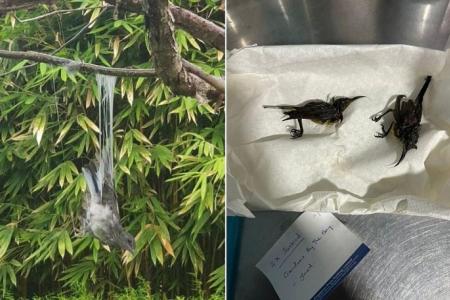Glue traps found at Gardens by the Bay, sparking poaching concerns
Gardens by the Bay is investigating a report from animal welfare group Acres that several birds were the victims of poaching on its premises in recent months.
In a Facebook post on Oct 18, the Animal Concerns Research and Education Society (Acres) highlighted this recent spate of incidents.
In its post, it noted that within the span of two months, four birds had died after being ensnared in tree branches that had been smeared with glue. The three incidents, one of which involved two birds, all took place at Gardens by the Bay between August and September 2024.
A Gardens by the Bay spokesperson told The Straits Times that internal investigations are currently ongoing, but the culprit has yet to be caught.
To prevent future occurrences of poaching on its premises, it said it has also implemented several surveillance and enforcement measures.
“We have been working closely with the relevant authorities to put deterrents in place, including increasing the frequency of patrols, installing CCTV cameras at hotspots and trimming low-hanging branches to deter poachers from setting up traps,” the spokesperson said.
“We also enlisted the help of Acres to train our staff to look out for signs of suspected poaching, such as the presence of traps or caged birds, and equipment like glue, nets and ropes.”
The first incident happened on Aug 11, when an oriental magpie-robin was found dangling from glue smeared on a branch at Gardens by the Bay, Acres told ST. On the same day, a pair of olive-backed sunbirds were found glued to the branches of another tree.
The third incident occurred a month later on Sept 30, when a white-throated kingfisher was found glued to a tree.
Of the three species, the oriental magpie-robin is listed as “nationally vulnerable” on the IUCN Red List, which means that it is locally threatened.
Mr Alan Owyong, former chairman of the Nature Society Singapore’s Bird Group, said: “This is a prized song bird in the pet bird trade and can be sold for hundreds of dollars if it sings well.”
The other two bird species are listed as “least concern” in the IUCN Red List, and are therefore not endangered.
However, according to Mr Ting Wai Kit, co-founder of the CITES Global Youth Network, poaching with glue poses a risk to all bird species, as it indiscriminately ensnares any bird which comes into contact with it. This includes endangered ones such as the straw-headed bulbul, which has its last stronghold in Singapore.
He also said that the three species implicated in these incidents are linked by a common thread.
“These birds play crucial roles in maintaining Singapore’s ecological balance by controlling insect populations, pollinating plants, and dispersing seeds.
“These species are susceptible to glue traps because their habitual perching, trusting nature and familiarity with human presence may reduce their wariness of altered environments and make them easy victims of this poaching method.”
Akin to poaching with traditional glue traps - where adhesives are applied onto a board or tray - this method of poaching leads to high mortality in trapped birds.
Mr Movin Nyanasengeran, vice-president of the Bird Society of Singapore, said: “Rescuing glue-trapped birds often requires the extensive removal of feathers that could impede the birds ability to thermoregulate or fend for itself in the wild.”
“It causes immense suffering and often leads to death from stress, injury, predation, starvation, dehydration or suffocation,” said Mr Ting.
“Poachers typically use strong, sticky substances designed to remain effective in outdoor humid conditions. These can range from industrial adhesives to homemade concoctions,” said Mr Ting.
Poachers are also strategic in where they apply the glue, often observing birds for a few days before lathering glue on parts of the branches where they commonly land.
While local wildlife groups believe that these are isolated cases which do not reflect a broader trend of increased poaching here, they remain a reminder that wildlife poaching does exist within Singapore’s borders.
ST has contacted the National Parks Board (NParks) for more information.
Concerned citizens may keep a lookout for such traps, which often consist of dark-coloured glue applied to bare twigs or tree barks, said Acres in its Facebook post.
Those who spot a glue-lathered tree may contact NParks at 1800-476-1600. If a trapped bird is seen, they should call Acres’ wildlife rescue hotline at 9783 7782 immediately. One should not attempt to remove the trapped bird without guidance, as improper handling may further harm it.
Gardens by the Bay also urged members of the public to alert its staff or security officers if they see any poaching activities. It added that offenders would be reported to NParks and the police.
Under the Wildlife Act, poaching activity in Singapore is illegal. Those found guilty may be fined up to $50,000, and the poached wildlife will be seized.
Get The New Paper on your phone with the free TNP app. Download from the Apple App Store or Google Play Store now


